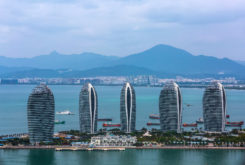The suspension by Capital Airlines of its route between Beijing and Lisbon was a disappointment for both Portuguese and Chinese governments, but the route is set to resume in the next few months, operated by a much larger carrier – Air China.
Capital Airlines suspended in October its direct flight between Hangzhou, on the east coast of China, and Lisbon, with a stop in Beijing. It launched the route on July 2017, with three flights a week.
This decision was very inconvenient for the two governments, who long pointed to the route as vital for strengthening bilateral ties. In public, they say that these ties are at a historic high.
According to sources, the Lisbon-Beijing flight occupancy rate was close to 80%, well above the threshold to make a route profitable. But the company´s financial difficulties made significant downsizing inevitable. It is one of the subsidiaries of Chinese group HNA which is facing a serious liquidity crisis. It closed last year with debts of 598 billion yuan — about 77 billion euros at current exchange rates.
According to our sources, discreet negotiations are going on, and likely to succeed, for Air China to take over the Beijing-Lisbon route. If these talks go well over the next few weeks, the resumption of flights could be announced during the visit of President Xi Jinping to Lisbon, set for early December.
In this scenario, Air China´s maiden flight to Lisbon could go ahead as early as February 2019, the same sources say.
The connection between the two capitals is full of political and diplomatic significance. Both governments also see it as very important from a business point of view.
Over the last few years, tourism has become an engine of economic growth for Portugal. According to official data, Chinese tourists generated revenue of almost 130 million euros in 2017; they have consistently been among the foreign visitors whose numbers and expenditure have grown the most.
In 2017, the number of Chinese who visited Portugal grew 40.7%, to 256,735.
But Portugal sees this potential as still largely untapped, as the number of Chinese tourists in Portugal is still far below the number in neighbouring countries such as Spain or France. The total number of Chinese going abroad is increasing steadily each year; this growth is likely to continue in the next few years.
Having recently opened a consulate in Guangzhou, the third largest city in China, Portugal is expanding its diplomatic presence in China. It has also opened new offices for its trade and investment agency, Aicep Portugal Global.
For Beijing, the air connection is also economically significant, given the presence of Chinese investors in key sectors, such as energy (EDP, Energias de Portugal), banking (Banco Comercial Portugues), insurance (Fidelidade) and health services (Luz Saúde).



